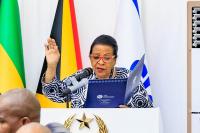ISAGS to provide a policy journal for discussion of the Post-2015 Agenda

A place for strategic policy debate on the Post-2015 Global Development Agenda: that is what the South American Institute of Government in Health (ISAGS) intends to offer by launching the journal ‘Post-2015 and Sustainable Development Goals: the South American View’. The journal, the first publication of its kind edited by the Institute, is designed to foster broader critical debate and exchange of practical experience from a South American standpoint. To that end, the ISAGS invites managers and workers in the fields of health and public policy, members of civil organisations and social movements, students and researchers to contribute previously unpublished articles, essays, debates and analyses on the theme. Those interested should submit their contributions by 30 August.
The journal is addressed directly to the Institute’s target public: senior policymakers in South America, health and foreign ministers, secretaries and directors of health institutions strategic to the region, such as national institutes of health, national cancer institutes, schools of public health, health technical schools, as well as members of sub-regional bodies, such as the MERCOSUR, ACTO, ORAS-CONHU, and regional bodies such as the Pan-American Health Organization (PAHO) and others.
“This publication is designed to cater to a policy readership. One of our mandates as an Institute is to offer input to foster an articulated regional endeavour in global health. To that end, we identified a need to put together a publication directed to conjunctural analysis, and to sharing experience and reports that speak for South America”, explained Mariana Faria, head of the ISAGS office.
New Global Agenda
The Sustainable Development Goals (SDGs) will succeed the eight Millennium Development Goals (MDGs), set to expire on 31 December 2015. Researcher Alessandra Ninis, who heads the ISAGS Social Determination of Health area, explains that the thematic journal also intends to offer food for thought on the new geopolitical context in which the Post-2015 Agenda is being assembled.
“The new goals are being set, and their targets and indicators defined, in a more complex geopolitical context, with hazier boundaries between North and South, with new economic actors, new alliances and, most importantly, with changes that have re-signified power relations in the world”.
One of the most important changes in this regard is the role of health on the new Agenda. Rômulo Paes, director of the World Centre for Sustainable Development (Rio+) and member of the extended editorial board of the Post-2015 journal, feels that health has lost space in relative terms on the new Agenda. That process is not all bad, though, because a broader concept of health prevails in discussions today, and related issues that had not been properly contemplated by the MDGs – such as life in big cities, for instance – have received more attention.
“We must have information from various different areas if we are to understand the health contexts that populations live in. It is important for us not to look just at the health sector, but to understand that this information is essential for us to characterise the social and economic contexts where populations live. That is essential for health policy to understand these populations’ realities and to define its strategies and responses to their demands. In that respect, an agenda that is more diverse, more integrated and more representative of the various contexts populations live in is good for everyone, including for health”, Paes argues, concluding that: “This ISAGS initiative is essential to the debate between the health and other policy areas”.
The journal’s extended editorial board also includes Alberto Pellegrini Filho, director of the Centre for Studies, Policies and Information on the Social Determinants of Health (CEPI-DSS/Fiocruz) and Doris Sayago, director of the Sustainable Development Centre at the University of Brasília (UnB).
Submisson dates
Articles should be submitted to e-mail: revistapos2015@isags-unasur.org by 30 August 2014.
Format
Original articles and essays should not exceed 15 pages. Font: Arial 11. Margins (cm.): top: 3.0; left: 3.0; right: 2.0 and bottom 2.0. Abstracts, in the language of the article, should not exceed 15 lines. Opinion and discussion pieces should not exceed 10 pages. Font: Arial 11. Margins (cm.): top: 3.0; left: 3.0; right: 2.0 and bottom 2.0. Abstracts,
in the language of the article, should not exceed 12 lines.
Language
Articles will be accepted in English or Spanish, the UNASUR’s two working languages, as stipulated in Article 64 of the Constitutive Treaty of the bloc’s General regulations. Abstracts will be published in the UNASUR’s four official languages: English, Spanish, Portuguese and Dutch. Abstracts will be translated into the other three official languages by ISAGS for approval by the authors



